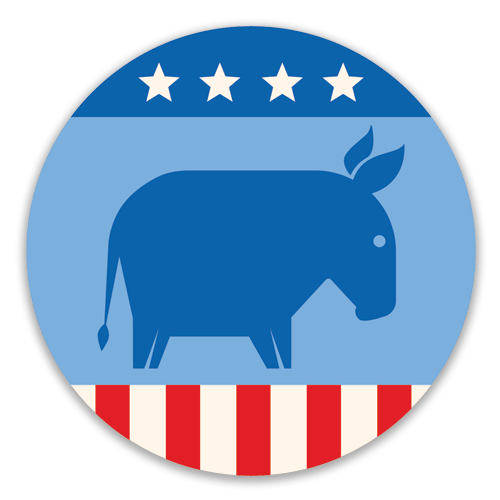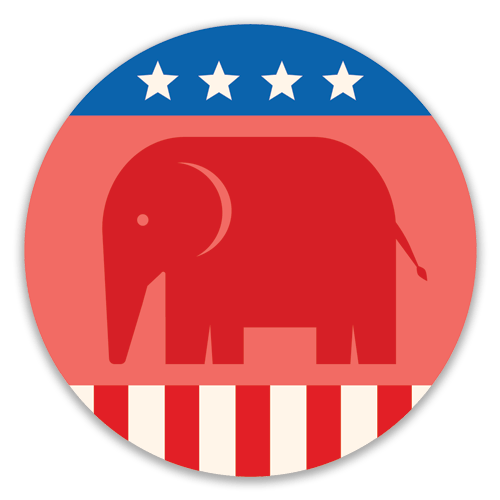Undecided Voters
Where Do They Stand?

Joe Biden

Donald Trump
The Economy
Reopening the Economy: Cautious
Reopening the Economy: Yes
Back on Track: Trillions More
Wants Washington to offer states more support in paying for unemployment benefits and says households – as well as local governments – need more support to get through the shutdown.
Back on Track: Onetime Stimulus
Supports further stimulus measures, including payroll tax cut.
Taxes & Wages: Raise Minimum Wage
Supports raising the national minimum wage to $15 an hour from $7.25 and expanding some tax credits for lower-income workers.
Taxes & Wages: No to Raising Taxes
The Trump campaign is attacking the policy of raising taxes while the economy struggles to recover.
Trade: Boost Domestic Manufacturing
Criticizes Trump’s tariff war with China as bad for US consumers and farmers.
Trade: Boost Domestic Manufacturing
Says America’s difficulties in procuring medical supplies internationally during the pandemic are another reason to encourage U.S. companies to avoid offshoring.
Green Investments: $2 Trillion
Green Investments: Little Appetite
Race and Criminal Justice
Diversity: Promises Inclusion
Diversity: Few Black Advisers
Policing: Reform Qualified Immunity
Has resisted activist calls to “defund the police,” instead promising to invest $300 million in a program that gives grants to hire more diverse officers and train them to develop less adversarial relationships with communities.
Policing: "Law & Order"
Signed an executive order to take steps toward police reform. It encourages police to use the latest standards for use of force, banning chokeholds unless an officer’s life was in danger, and called for legislation to do more.
Democrats faulted the order for allowing some exceptions to the chokehold ban and placing no restrictions on warrants that let police enter a suspect’s property without knocking.
Criminal Justice Reform: Yes
As a senator, Biden voted for a 1994 crime bill that critics see contributing to the mass incarceration of Black Americans.
Criminal Justice Reform: Yes
Has also supported some “tough-on-crime” policies that disproportionately affect minorities, including seeking to restart executions of federal death row inmates.
Addressing Racial Economic Disparities
Says he would have a group study the feasibility of paying cash reparations to Black people as a result of slavery and segregation.
Addressing Racial Economic Disparities
Support for HBCUs: Yes
Support for HBCUs: Yes
Healthcare
Obamacare: Yes
Does not support a single-payer system like Medicare for All. Instead calls for a Medicare-like public option that would serve as an alternative, not a replacement, for private insurance.
Obamacare: No
Has not proposed a comprehensive replacement, despite Trump’s vow to deliver a better, less-costly healthcare system.
Lower Drug Prices: Yes
Supports some form of importing prescription drugs from foreign countries to lower costs.
Lower Drug Prices: Yes
Supports some form of importing prescription drugs from foreign countries to lower costs.
Medicare/Medicaid Expansion: Yes
Medicare/Medicaid Expansion: No
Immigration
Limit Immigration During Pandemic: No
Has said he would pause deportations for 100 days after taking office, but his campaign did not comment on the coronavirus-related border rules.
Limit Immigration During Pandemic: Yes
Trump has restricted the entry of many foreign workers and immigrations seeking “green cards” for permanent residency, and implemented a public health emergency policy that allows U.S. officials to rapidly deport migrants caught at the U.S.-Mexico border.
Dreamers: Protect DACA
Dreamers: End DACA
The high court’s ruling – which found Trump’s termination of the program was “arbitrary and capricious” – left the administration the option to try again to end it. The Trump administration issued a memo in July that clamped down on the program, blocking new enrollment and allowing only renewals that last one year, down from the current two-year period.
US-Mexico Border Wall: No
US-Mexico Border Wall: Yes
Family Separation: Reunite Families
Family Separation: Separated Thousands
Travel Ban: No
Travel Ban: Yes
Climate Change
Climate Plans: Yes
Supports research into advanced nuclear energy.
Climate Plans: No
Has rejected mainstream science on climate and said in April, “Our carbon, our atmosphere, our — the level of environmental cleanliness is at its all-time best right now” — an inaccurate claim. Like Biden, he supports advanced nuclear technology.
Tougher Auto Emissions: Yes
Tougher Auto Emissions: No
Ban on Coal & Fracking: Cautious
Supports investing in coal communities by offering alternatives to mining work.
Ban on Coal & Fracking: No
Has announced plans to slash air and water regulations but due to abundant natural gas and falling prices for wind and solar power, he has failed to stop coal plant shutdowns during his term in office.
Climate Diplomacy: Yes
Climate Diplomacy: No
Foreign Policy
US-China: Global Pressure on China
Argues that China relishes a chaotic Trump administration, his alienation of American allies, and his abdication of U.S. leadership roles in global institutions, such as the World Health Organization.
Says he will correct this by bringing multilateral pressure to bear on China through renewed relations with U.S. allies.
US-China: Stand up to Beijing
In July, Trump issued an executive order to end the United States’ special commercial treatment of Hong Kong after Beijing imposed national security legislation on the former British colony, and his administration abruptly told China to close its Houston consulate amid accusations of spying.
Military in the Middle East: Narrowed Focus
In January, after Iranian proxies and U.S. forces clashed in Iraq, Trump ordered a strike that killed the powerful Iranian commander Qassem Soleimani. Biden has said the strike “put the United States and Iran on a collision course.”
Wants to end U.S. support for Saudi Arabia’s war in Yemen, which Trump has defended.
Military in the Middle East: Mixed
But has sent more troops to the region after the withdrawal increased tensions with Iran. In January, after Iranian proxies and U.S. forces clashed in Iraq, he ordered a strike that killed the powerful Iranian commander Qassem Soleimani.
Iran Nuclear Deal: Yes, With Conditions
Iran Nuclear Deal: No
Afghanistan: Bring Troops Home
Says he would have a group study the feasibility of paying cash reparations to Black people as a result of slavery and segregation.
Afghanistan: Full Withdrawal
In February, the Trump administration reached a deal with the Taliban on phased U.S. force reductions, but it was dependent on the Islamist militant group meeting conditions. Escalating violence since then has raised questions about whether Trump can bring all U.S. troops home anytime soon.
On Meeting North Korea’s Leader
On Meeting North Korea’s Leader
Alliances: Yes
Has warned that Russia, China and others who try to interfere in U.S. elections will face serious consequences if he is elected president.
Alliances: No
Trump announced in June that he would reduce the number of U.S. troops in Germany by about 9,500. Biden campaign aides say Biden would revisit the issue as president.
Tech
Breaking up Big Tech: Maybe
Biden has said dismantling companies like Facebook was “something we should take a really hard look at.”
Breaking up Big Tech: Maybe
The Trump administration is conducting a wide-ranging antitrust probe into major tech companies, but both he and Biden have stopped short of calling for the firms to be broken up.
Regulating Social Media: Yes
Biden recently called for Facebook to fact-check politicians’ ads in the two weeks ahead of the presidential election.
Regulating Social Media: Yes
After Twitter put fact-checking labels on two of Trump’s tweets for the first time in May, the president signed an executive order that seeks new regulatory oversight of tech firms’ content moderation decisions and he backed legislation to scrap or weaken Section 230 in an attempt to regulate social media platforms. Experts said the executive order was unlikely to survive legal scrutiny.
Data Privacy Protections: Stronger
Data Privacy Protections: Mixed
Privacy advocates have slammed the Trump administration for actions they say violate immigrants’ privacy and for repealing broadband privacy laws that required internet providers to get consumer consent before using certain types of their data.
Fixing the Digital Divide: Yes
Fixing the Digital Divide: Yes
Trump has said he is committed to ensuring “every citizen can have high-speed internet access.” In January, the Federal Communications Commission approved a $20 billion rural broadband expansion fund.
Sources:
Reuters reporting
